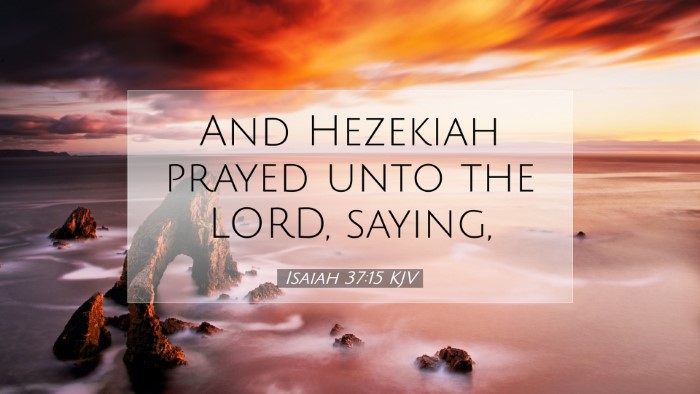Commentary on Isaiah 37:15
Text of Isaiah 37:15 (KJV): "And Hezekiah prayed unto the Lord, saying,"
Introduction
This verse captures a pivotal moment in the reign of King Hezekiah of Judah, emphasizing his reliance on God amidst dire circumstances. As we delve into this passage, we will explore the key themes of prayer, reliance on God, and the context surrounding this plea for divine intervention.
Contextual Background
The historical context of Isaiah 37 is framed within the Assyrian siege of Jerusalem, during which King Hezekiah faced overwhelming odds. The Assyrian king, Sennacherib, had sent a threatening letter to Hezekiah, boasting about his previous victories and questioning the ability of Judah’s God to save them. Hezekiah's response was not one of despair but of earnest prayer, revealing his faith and humility before God.
The Nature of Hezekiah's Prayer
Hezekiah's prayer, as recorded in this chapter, can be analyzed through various perspectives:
- Desperation and Faith: Hezekiah's circumstances were dire; he turned to God as his only hope. This demonstrates his faith in God's omnipotence.
- Recognition of God’s Sovereignty: His prayer acknowledges the Lord’s authority over nations and kingdoms. He does not approach God with mere formality, but with an understanding of His power.
- Intercessory Aspect: Hezekiah's prayer is not merely for personal deliverance; it is a plea for the entire nation of Judah, showing a heart of concern for his people.
Commentary Insights from Public Domain Commentators
Matthew Henry
Matthew Henry emphasizes the importance of prayer as the believer’s lifeline in times of trouble. He notes that Hezekiah’s act of prayer was not just the last resort, but an expression of his unwavering trust in God. Henry draws attention to the humility in Hezekiah’s prayer, showing that true prayer arises from a humble heart that recognizes its dependence on the Lord. He highlights the thoroughness of Hezekiah’s approach, where he spreads the letter of Sennacherib before the Lord, asking God to read it and act.
Albert Barnes
Albert Barnes provides a rich analysis of the text, focusing on the theology of prayer presented in this verse. He notes that Hezekiah's prayer signifies a direct appeal to God’s mercy and recognizes Him as the source of help in crisis. Barnes elaborates on the components of an effective prayer which Hezekiah embodies: earnestness, sincerity, and a plea for divine intervention. Additionally, Barnes points out that prayer should reflect an understanding of God's nature and His ability to deliver.
Adam Clarke
Adam Clarke delves into the implications of Hezekiah's prayer in the broader narrative of scripture. He notes that this incident demonstrates a pattern of reliance on God that is pivotal for both leaders and individuals. Clarke emphasizes the need for faith under pressure, suggesting that Hezekiah’s response was integral to the deliverance that followed. He also encourages readers to observe that prayer is often accompanied by action and faith, as seen in Hezekiah's subsequent steps post-prayer.
Theological Reflections
This prayer of Hezekiah serves several theological imperatives for the faith community:
- Importance of Prayer: It reinforces the significance of prayer in the life of believers, especially in the face of seemingly insurmountable challenges.
- God's Sovereignty: This verse affirms that God is sovereign over every situation; Hezekiah's prayer is a model of seeking divine perspective and intervention.
- Community Focus: Hezekiah’s prayer acts as a reminder that leaders should intercede for their communities and that prayer can lead to corporate transformation.
Applications for Today’s Believers
As modern-day believers read Isaiah 37:15, they are invited to reflect on the following applications:
- Personal Prayer Life: Engage in prayer as a first response, not a last option, in times of difficulty.
- Understanding God’s Role: Cultivate a deeper understanding of God’s sovereignty and ability to intervene in human affairs.
- Community Intercession: Encourage church leaders and the congregation to intercede for one another, recognizing the power of collective prayer.
Conclusion
Isaiah 37:15 encapsulates a moment of profound dependence on God, exemplified by King Hezekiah. The insights drawn from historical indents and public domain commentaries provide a rich tapestry of understanding this verse. Through careful analysis, we glean lessons of humility, faith, and the significance of prayer—fortifying believers today in their spiritual journeys, and encouraging them to approach God earnestly in prayer.


